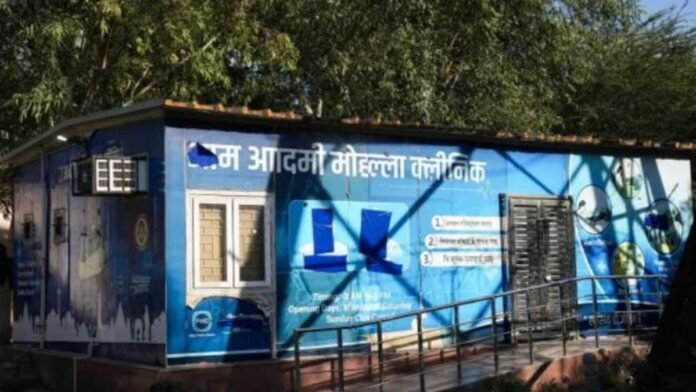
Key Takeaways
- The Delhi Health Department ordered the immediate shutdown of 121 Mohalla Clinics in porta cabins located within one kilometer of Arogya Mandirs, affecting approximately 2,000 healthcare workers including doctors, nurses, pharmacists, and support staff.
- Clinic staff report receiving no warning despite a Central Administrative Tribunal order from August 21, 2025, requiring two weeks’ notice before termination of any contractual employee before March 31, 2026.
- This marks the second wave of closures in 2025, following the shutdown of 31 clinics in August, as the BJP-led government transitions from AAP’s Mohalla Clinic model to the Ayushman Arogya Mandir system.
- Chief Minister Rekha Gupta previously assured in May and June 2025 that existing Mohalla Clinic staff would be given priority and absorbed into the new Arogya Mandir system, promises employees say have not materialized.
- Health officials have begun recruiting fresh staff for Arogya Mandirs through new interviews, effectively bypassing the existing workforce despite their years of service since 2015.
New Delhi: The Delhi government has ordered the closure of 121 Mohalla Clinics operating from portable cabins within a one-kilometer radius of newly established Ayushman Arogya Mandirs, triggering a crisis that threatens the livelihoods of approximately 2,000 healthcare workers across the capital. The directive, issued on Friday, October 25, 2025, by Dr. Manoj Kumar Gupta, State Program Officer of the Aam Aadmi Mohalla Cell (AAMC), instructed clinic doctors to prepare comprehensive inventory lists by Saturday, with consolidated district-wise reports due Monday morning.
Legal Protections Allegedly Violated
The abrupt closure has sparked allegations of legal violations, with affected employees claiming they received no warning despite explicit protections established by the Central Administrative Tribunal (CAT). On August 21, 2025, CAT issued an order prohibiting the Delhi government from dismissing nearly 1,000 contractual employees hired under the AAMC before March 31, 2026, and mandating a two-week notice period for any terminations. Several Mohalla Clinic doctors confirmed to media outlets that they were not provided the legally required notice, potentially placing the government in contempt of the tribunal’s directive.
The tribunal’s order came after approximately 1,000 Mohalla Clinic staffers approached CAT seeking permanent absorption into the Ayushman Arogya Mandirs, the BJP government’s replacement for the AAP-era primary healthcare initiative. CAT also directed the Delhi government to file a detailed affidavit addressing the regularization of these contractual staff members, a requirement whose status remains unclear.
Pattern of Closures and Broken Promises
This latest shutdown represents the second major wave of Mohalla Clinic closures in 2025. In August, the Delhi Health Department ordered the closure of 31 clinics operating from porta cabins and rented accommodations, citing “non-availability of doctors”. Staff from those facilities reported being left in limbo, with some told to stay home while awaiting reassignment orders that never materialized. According to available documentation, one of those 31 clinics was converted into an Ayushman Arogya Mandir, while the remaining facilities were effectively shuttered.
Jitendra Kumar, president of the Mohalla Clinic Union, characterized the closures as a systematic dismantling of the healthcare model established under the previous AAP government. “With this decision, nearly 2,000 mohalla clinic workers will lose their livelihoods,” Kumar stated, emphasizing that many employees have worked in these facilities since 2015, earning modest salaries between ₹8,000 and ₹10,000 monthly based on patient volume.
Chief Minister’s Unfulfilled Assurances
The mass closure contradicts multiple public assurances made by Chief Minister Rekha Gupta earlier in 2025. In May, addressing growing concerns among healthcare workers, Gupta explicitly stated: “There is no reason to worry. No one will lose their job. In fact, the existing staff will be prioritised in the new system”. She reiterated this promise in June during a public meeting, specifically committing that Mohalla Clinic employees would be absorbed into the Ayushman Arogya Mandir framework.
However, union representatives and affected workers report that instead of honoring these commitments, health department officials initiated fresh recruitment processes, conducting interviews for new staff while sidelining existing employees. “Officials have kicked off the recruitment process and have been taking interviews, effectively pushing out existing employees,” Kumar alleged, highlighting the disconnect between political promises and administrative actions.
Transition from Mohalla Clinics to Arogya Mandirs
The closures form part of the BJP government’s broader strategy to replace the AAP’s Mohalla Clinic model with Ayushman Arogya Mandirs, an expanded primary healthcare facility offering more comprehensive services. While Mohalla Clinics provided basic consultations, essential medicines, and limited diagnostic tests, Arogya Mandirs are designed to offer screening for five types of cancer, pre- and post-natal care, 12 types of vaccinations, 105 medicines, and up to 79 diagnostic tests through direct provision and outsourcing.
The Delhi government launched the first Arogya Mandir at Tis Hazari Court premises in May 2025, with plans to establish 1,139 such facilities across the capital in phases. By September 2025, the government had inaugurated over 150 Arogya Mandirs, including 101 facilities opened by Union Home Minister Amit Shah on Prime Minister Narendra Modi’s 75th birthday. The September inaugurations represented a ₹503.49 crore investment in healthcare infrastructure.
Healthcare Access and Employment Crisis
The systematic closure of Mohalla Clinics raises concerns about healthcare access for Delhi’s urban poor and lower-middle-class residents who relied on these neighborhood facilities. Established in 2015 under AAP leadership, Mohalla Clinics were designed to serve populations of 10,000-15,000 people within walking distance, eliminating the need for long queues at government hospitals. Each clinic typically operated with a small team including doctors, pharmacists, nurses, and multi-tasking workers, providing free primary healthcare regardless of patients’ ability to pay.
For the affected workforce, the closures represent an existential threat. Many employees have dedicated eight years to these facilities, with families dependent on their modest incomes. According to AAP Delhi State President Saurabh Bharadwaj, who flagged concerns about the closures as early as May 2025, these workers’ earnings have remained stagnant since 2015 despite inflation, with no dearness allowance adjustments. The previous AAP government had reportedly issued orders to increase its compensation before leaving office, but these were never implemented.
Administrative Response and Next Steps
The Health Department’s October 25 order required clinic doctors to prepare detailed inventories covering logistics, medicines, consumables, medical and non-medical equipment, and all other workplace resources. These lists were to be compiled and consolidated on a district-wise basis by Monday morning, October 28, 2025, for presentation at a scheduled meeting. The swift timeline and comprehensive documentation requirements suggest preparations for permanent facility shutdowns rather than temporary operational adjustments.
As of late October 2025, the Delhi government has not publicly addressed the CAT order violations or clarified the employment status of the approximately 2,000 affected workers. The administration also has not responded to requests for comment on whether it intends to honor the Chief Minister’s earlier assurances about absorbing existing staff into the Arogya Mandir system. Union representatives have indicated they will pursue legal remedies if clarity is not provided by the start of the week.
The crisis highlights the broader political tensions surrounding healthcare delivery in Delhi, where the AAP’s Mohalla Clinic model had become a signature achievement before the BJP’s electoral victory in early 2025. Critics of the current administration characterize the closures as a politically motivated dismantling of a successful public health initiative, while the government frames the transition as an upgrade to a more comprehensive healthcare infrastructure aligned with the central government’s Ayushman Bharat program.




















































